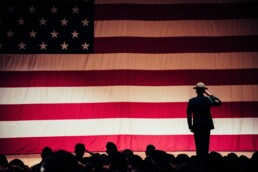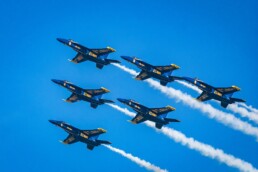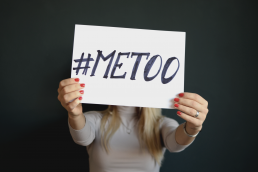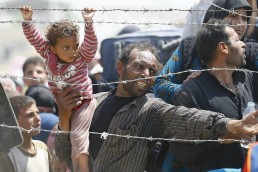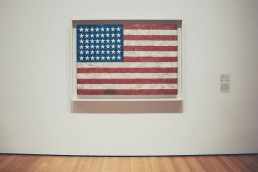Though I have never been a member of a CrossFit gym, I have to admit that I do enjoy many of CrossFit’s workouts. They often challenge you in a way that other group gym classes simply do not. That said, one of the main reasons I have never been a member is that I struggle with some aspects of CrossFit’s culture. One such aspect is CrossFit’s close ties to the armed services and the choice to name every “Hero WOD” (for those not familiar, these are specific and especially difficult benchmark workouts) after military members who died in duty. Take, for instance, the annual Memorial Day Hero staple of “Murph.” Murph is named after Lt. Michael Murphy, who was killed in action in Afghanistan in 2005. It is a great and challenging workout, and one I was especially thankful to be able to have just completed with friends, since health issues over the past year+ have forced me to almost exclusively work out in my basement. Alone.
Unlike me during my basement workouts, CrossFit is certainly not alone here. It is an accurate representation of a large segment of the American population. By and large, we love our military. We spend more on it than any other nation on earth (more than the next 9 countries combined, actually) and have more than 750 bases in at least 80 other countries around the globe. For context, only 3 others have more than 10, and the next four countries on the list don’t even have 100 foreign bases combined. The American military machine is very well-funded and quite vociferously supported. The US has, quite simply put, the largest and most powerful military to ever exist.
If you dive into the details of just about any event, especially of any war, battle, or even a simple quarrel between friends, you’ll find conflicting accounts of what actually took place. Things get messy and complicated, and any two people almost never remember things the same way. The same is true when it comes to what happened to Lt. Murphy and his SEAL team.
The official Navy bio for Murphy states that his SEAL team encountered a Taliban militia of over 50. Marcus Luttrell, the only surviving member of Murphy’s team, wrote a book suggesting they faced between 80-200 men. Both narratives suggest 35+ enemies were killed and over 80 casualties were inflicted by the 4 SEALs in the firefight. The evidence, however, including accounts from people there in the village that day, video footage, and other military members, contradicts this. The video evidence suggests a military of 7 members. Andrew MacMannis, a former Marine Colonel who was a part of the search and recovery team sent in to extract the bodies of the SEALs, says there were no reports of any enemy casualties. Patrick Kinser, another former Marine who participated in this operation, responded to Luttrell’s after-action report saying, “I’ve been at the location where he was ambushed multiple times. I’ve had Marines wounded there. I’ve been in enough firefights to know that when shit hits the fan, it’s hard to know how many people are shooting at you. [But] there weren’t 35 enemy fighters in all of the Korengal Valley [that day].”
I don’t bring this to attention to suggest that Murphy or his team did not display incredible courage that day. I have no goals of disparaging someone who faced a more difficult and desperate situation than I hope to ever face. I simply want to highlight these discrepancies to show that military groups, like any business, have an agenda. Every military wants to project their side as the heroes and the other side as the villains. It’s classic storytelling. And they will often distort, cover up, or embellish details in order to ensure that their personnel and their operations come out looking how they desire.
As Sherman said, “war is hell.” So can we really be surprised that the very system that trains people for and operates solely in “hell” is often dark, depraved, and reticent to allow the world see it for what it truly is?
While I do believe that there are some incredibly heroic people who have served in the military, men and women who have courageously and selflessly sacrificed their own lives or well-being for the sake of others, I don’t think it’s healthy for a culture to automatically categorize anyone that anyone who serves in the military as noble or heroic. The failures in strategy, execution, and morality of the American military are well-documented and quite lengthy. Plenty of recruits and troops have been all too eager to kill. Some have committed terrible atrocities, many of which are covered up by the armed forces administrations and never released to the general public. Some of these people may even be labeled heroes or given medals. Just from what little has managed to surface, we know that our military has knowingly utilized torture, practiced discrimination, encouraged hatred, committed rape (so. much. rape.), killed hundreds of thousands of innocent civilians, left communities and countries completely decimated, and more. We’ve dropped millions of bombs and fired countless missiles at targets all around the world (an average of 46 per day between 2001-2021), often based on shaky intel that turned out to be incorrect, with little to no concern for the causalities. And this doesn’t even take into account that we’ve frequently launched entire extended military campaigns that are carried out in bad faith with no real evidence to justify our actions (WMDs, anyone?). So even when troops display exceptional courage in carrying out their orders or sacrificially give their lives, we’re sadly forced to also try and understand if what they gave their life for was ever noble in the first place.
The evidence clearly shows that, despite the general American sentiment, our military is often, if not typically, not a shining savior or bastion of morality. As Sherman said, “war is hell.” So can we really be surprised that the very system that trains people for and operates solely in “hell” is often dark, depraved, and reticent to allow the world see it for what it truly is?
As a nation, we’re fed a lot of military propaganda. Much of it we probably don’t even recognize. We grow up looking forward to fighter jet stadium flyovers at our biggest sporting events. We go watch Air Shows. Those of us who were raised in the 80s know G.I. Joe as a “real American hero.” We are learn to sing ‘Wild Blue Yonder’ at a young age, not knowing that we’re internally cementing the positive association with both shooting the “enemies,” whoever they may be, and even going down in flames for our country. Our national anthem boasts of war and bombs bursting in air. We are frequently shown commercials for the armed forces during sports broadcasts that depict military members as superheroes. For an entire month, the NFL wears camouflage on the sidelines. Our cities and our nation’s capital are filled with monuments to those who’ve died while serving. And Hollywood loves a good war movie that depicts the valor and bravery of American soldiers.
Despite vehemently insisting that we are different and better than countries with military dictatorships, we still willingly participate in much of the same military fanfare and regalia. And most crucially, we seem to fail to ever stop to question if maybe, just maybe, violence and military might aren’t actually all that great. Maybe using bullying tactics like force and occupation to coerce others into giving you what you want isn’t so righteous after all. And maybe there are other things that we could pour time and energy into that would make us a more perfect union.
I know no profession is perfect. Search any field and it won’t take long to find people who are responsible for terrible acts and irreparable harm. And beyond this, no person is perfect. We are all incredibly complicated mixtures of good and bad, capable of selfish, cruel, or blatantly immoral behavior at times. In any person we label a hero, we’ll also find something dark. I think it’s important to understand and accept this tension. And acknowledging someone’s flaws doesn’t mean we can’t ever celebrate their positive accomplishments (though in some cases, it may).
But what if, instead of starting from the baseline of glorifying those whose job is to carry out violence, we chose to celebrate something different? What if we metaphorically (and literally) turned our “swords into plowshares” and our “spears into pruning hooks,” deciding that as a nation, we would no longer rise against other nations, and “nor will [we] train for war anymore”? (Isa. 2:4) What if we celebrated teachers; those who sacrifice their time, money, and energy, often for little pay, to serve our kids while we can’t even adopt enough gun reform to protect them? What about hospital workers like nurses who keep us alive in our most critical moments? What about Civil Rights leaders who were brutalized, suffered, or gave their lives for justice? How about those who enrich our lives through art and beauty? What about people grinding away in small, unheralded nonprofits who are bettering our communities despite having little funding and little to no pay for themselves? Or what about everyday people, the single parents tirelessly working two jobs to provide for their kids? The immigrants going to night school to learn a new language after they made the difficult decision to uproot their family and start completely over in a new place?
America’s identity and prosperity has been largely forged through violence and conquest. From early settlement to slavery to gaining independence through the Revolutionary War to westward expansion, to our modern wars and global military occupation, our history is littered with violence. And this violence is deeply rooted in so much of who we are and what we celebrate. It’s well past time to choose a new way of moving forward. One that celebrates humanity, love, empathy, and virtue. One that promotes acts of love and kindness instead of acts of war.
In trying to make this change for how we define a hero, there are myriad options. And while all people are complicated and imperfect, this kind of intentional paradigm shift could have a massive ripple effect culturally, not only our for own country, but the world.
Related
Related Posts
November 4, 2024
Jesus and the GOP: Enemies & Loving Your Neighbor
November 4, 2024
Jesus and the GOP: Immigration
November 4, 2024
Jesus and the GOP: An Introduction
August 14, 2019
Christians & Pregnancy Outside of Marriage
October 18, 2017
#MeToo: A Call to Men
March 31, 2017
The Workplace, Fidelity, and Sexism
February 25, 2017
Trumping the Truth
January 31, 2017
Your Neighbor As Yourself
January 10, 2017
Thanks, Obama
November 17, 2016


